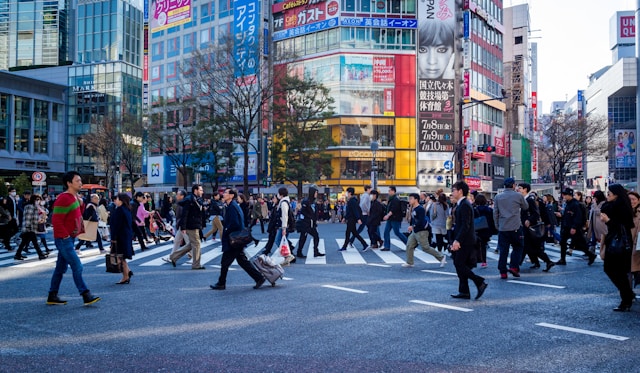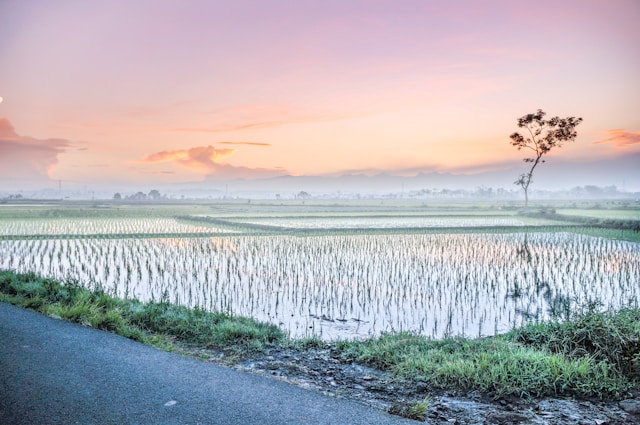

Teaching in Japan: Urban areas vs. Countryside

When you become an ALT in Japan, one of the first questions you ask is: Where will I work? Depending on the company, you will be sent to whichever location is required. They will ask you for your preference and take this into consideration when finalizing your new home.
Here are the pros and cons between the concrete city of Tokyo to the mountainous countryside.
First, let’s start with the cities. The major city hubs are renowned for their vibrancy and nightlife. Many ALTs tend to lean more towards the city areas as it’s the more comfortable choice.
Benefits of being an ALT in the City
1. Convenience
Whatever you want can be accessed with a small walk and some determination. A convenience store is a 2-minute walk, and the closest dentist is right beside the station. If you are craving some food at 4 in the morning, there’s a Sukiya right beside the Mcdonalds. There are also so many supply shops for classroom activities.
2. Transportation
Cities like Tokyo, Osaka, Kyoto, Hiroshima, and Saitama have some of the biggest transportation hubs. For your commute, you would be able to find a bus or train route that leads directly to your school from your home. Many schools are close to stations in the city for easier access.
3. Activities
As an ALT, your job ends when school ends! You have plenty of time to explore your neighborhood or travel to the popular nightlife areas. If you’re an extrovert, city life is more suited for you! There are more varieties of activities you can do like shopping, recreational games (bowling, darts, and crane games). There are also a lot more choices for cultural food and restaurants.
4. More opportunity to make friends
Cities have more diverse communities than the countryside. Both Japanese and Foreigners are more open to friendships, and there are major communities from all over the world. There are also many hobby communities that you can join like Bowling/ Karaoke/Taekwondo/ and more!
5. More English-speaking
More and more Japanese have started to integrate English into their daily life. Many businesses have encouraged staff to speak English to travelers. If you are just starting out as an ALT and do not have a high Japanese proficiency, major tourist spots like Tokyo, Osaka and Kyoto are good choices!
6. More job/ part time opportunities
If you’re looking for part-time work, therewill be more opportunites in city areas. Various industries will welcome English-speaking convenience store clerks, eikaiwa teachers, or even servers with open arms. There are more job openings delegated towards expats that you can do easily and make some extra cash on the side.

Cons of being an ALT in the City
1. Cost of living
Japan’s cost of living has been stagnant for the past 20 years, however, it has started to change. The cost of food is marked up 25-30% higher than in the countryside, the cost of parking can be upwards to 500 yen per 30 minutes and the rent costs for a small studio apartment is 60-80,000 yen for a good location. To live comfortably in the major cities, you would need to make at least 230,000 yen.
2. Noise
Japan is very particular about noise. After 9-10pm, we expect everyone to be sleeping and quiet. But sometimes, that’s not the case. You can hear the raucous laughter of drunkards coming back home from the izakaya, the roar of motorcycles in the distance, or even singing from the karaoke bar down the street. Unless you live in a residential area, you will always be hearing some sort of noise.
3. Traffic/Delays
The Japanese subway and train station access is elite, but many problems can occur during your commute to and from your home. Trains are not usually late, but when they are you have no choice but to stay until the problem is resolved and say sorry to your vice principal for being late. There are also delays with buses, so always be on the lookout.
4. Commute
The bigger the city, the bigger the landscape. If you couldn’t find a house near your work, your commute could end up being 1-2 hrs each way. The average commute in Japan is roughly 70 minutes as residential areas are outside the major train lines. Those who are lucky enough to live close to their schools, still have to travel by bus, walking or riding a bike.
5. Limited space
The city is packed with many people, so apartment spaces are getting smaller and smaller. A studio apartment is reminiscent of your college dorm, with thin walls, bite-sized bathrooms, and a kitchen only big enough for Barbie dolls.
Commutes also only have limited space. If you take the trains in the morning, you will know the feeling of being packed like sardines and the breath of morning coffee from someone else’s mouth. Cities are tightly packed. Not to mention the amount of people you will see on the weekend. Get ready to walk like a zombie at Takeshita street, Shinjuku or Shibuya.
Benefits of living in the country as an ALT
Unlike city life, taking a backseat and entering the Japanese countryside is another good option. Many smaller cities and towns have their advantages and disadvantages too. Here are some examples:
-
Cost of living
Unlike the city, the countryside is much cheaper. With its local produce, discount supermarkets, and unmanned vegetable booths. Also, you would be able to afford a 2 bedroom, 1 living and kitchen space apartment for relatively the same price of 60,000-80,000 yen that you would get for a small studio in the city. Rent costs can go down even further with some older buildings being 25-30,000 yen.
2. Beautiful Scenery
Rivers, mountains, lakes, farms, and the ocean are all parts of the Japanese countryside. With the expansive wilderness, you can experience the wildlife and wonderfulness of nature. If you are an ALT in Gunma or Saitama, many natural onsens are more prevalent in the mountains.
3. Commute
Unlike the city, there are likely to be only one or two stations per town that people use and roughly 5-10 bus routes throughout the area. However, the smaller the town, the smaller the commute. If you have an apartment within the town, the commute is much easier through walking or biking. The bike paths are relatively larger in size to accommodate these modes of transportation. The average commute in the countryside is 25 minutes if you live in the town.
4. Smaller class size
Japan is in a crisis right now as the majority of the younger generation has decided to move to the city in pursuit of more job opportunities. With the population of rural towns declining, more schools are shutting down. Over 50 schools across Japan 2024 did not have any 1st graders and caused an emergency crisis with the Ministry of Japan. But this might be an advantage for you as an ALT. Smaller class sizes could be more beneficial for your teaching as well as the students learning the material. You will have more one-on-one time with individual students and see their improvements over time.
5. Peace/quiet
The countryside boasts its natural resources and wonderful wildlife. It also boasts peace and quiet. After 9pm, you will experience the calmness of the night. This is a good environment for introverts who prefer open spaces and tranquil atmospheres.
6. More space
City life can be majorly cramped, while in the countryside, you can have a larger living space, larger bike riding space and you will definitely have a seat on the train or bus when traveling. The countryside just has more space. You will be able to breathe easier and metaphorically stretch your legs.

Cons of Living in the Country as an ALT
-
Less access to emergency services
Emergency services are limited in the country, often relying on local volunteers. It would be a good idea to know how long it takes for an ambulance/fire department to arrive, just as a precaution. Many smaller towns have one or two emergency services stretched between two or three cities. So in the event of an accident in school or out, please be aware of the time help could arrive.
2. Limited activities
When the clock strikes 9pm, the countryside is quiet. Everyone is sleeping. There are not many night-time activities available. So, if you’re looking for fun, you should travel to a bigger city close to where your town is. Even during the day, the most fun you could get is probably at Starbucks. Recreational activities are mainly with nature: swimming, bicycle riding, hiking, climbing, or camping.
3. Local wildlife
In Japan, sometimes you will have to face the local wildlife. People in the northeastern parts of Japan are warned to stay vigilant of wild bears. Other parts, such as Okinawa and Tohoku have sighted wild boars attacking residents. When you move to these areas with local wildlife problems, you will be given instructions from the municipal city hall on how to deal with one when you see it. There will also be drills at school.
Is it best to be an ALT in a small town or big city?
Overall, it is up to you and your company on which place is the best fit for you. Please know that as an ALT, your placement can also change and one year you could be in the countryside and another in the city. It is a good way to experience both and understand where you would like to live later. Enjoy where you live as it comes, whether it be the vast Open valley of Tokushima or the bustling streets of Shibuya. Let your stay be a wonderful one and enjoy working in Japan.
Author: Fujimino ALT, S. C. Y. H.
Looking for an ALT job in Japan? Contact RCS to learn more about all our location opportunities available now!






